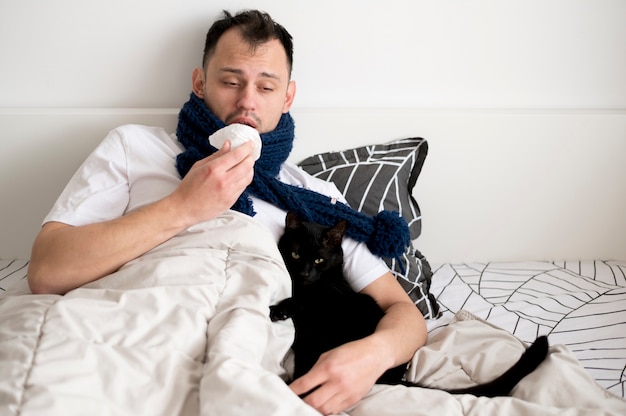Keeping Your Senior Pet Thriving: Senior Pet Care Tips

The bond between a pet and their owner is a truly special one. Over the years, our furry companions become cherished members of the family, offering unconditional love and companionship. As our pets age, their needs naturally evolve. Senior pet care becomes increasingly important to ensure their continued comfort, health, and overall well-being.
Recognizing the Signs of Aging in Pets:
As your beloved pet ages, their bodies and minds begin to change. While the exact age at which a pet becomes a "senior" varies depending on the species and breed, it's important to be familiar with the subtle signs that may indicate your pet is transitioning into their golden years. Keep an eye out for these potential indicators:
- Subtle Shifts in Behavior: Changes in your pet's sleep patterns, activity levels, appetite, or vocalizations can be early signs of aging. Senior pets may sleep more than usual or experience disrupted sleep cycles. You might notice a decreased interest in playing or taking walks in parks. Their appetite may decrease, or they could become pickier about their food. Additionally, senior pets may exhibit new behaviors like anxiety, housetraining accidents, or increased vocalization.
Early detection of these signs is crucial. By scheduling a comprehensive senior pet wellness exam with a veterinarian, you can ensure potential age-related health concerns are diagnosed and managed effectively, improving your pet's quality of life.
Proactive Senior Pet Care for a Long and Happy Life:
Regular veterinary checkups are the cornerstone of proactive senior pet care. Even if your senior pet seems healthy, scheduling regular visits with a veterinarian allows for early detection of potential health issues. Early intervention is key to managing chronic conditions like arthritis, diabetes, or kidney disease, which are more common in senior pets.
During a senior pet wellness exam, your veterinarian will perform a thorough physical examination, discuss your pet's medical history, and recommend diagnostic tests tailored to their individual needs. These tests might include bloodwork, urinalysis, or X-rays to assess your pet's overall health and screen for underlying conditions. Senior pet bloodwork plays a vital role in preventative care, providing valuable insights into your pet's organ function, blood cell count, and overall health status.
By prioritizing regular veterinary checkups and diagnostic testing, you empower your veterinarian to create a personalized senior pet care plan. This plan might involve adjustments to your pet's diet, medication regimens, or exercise routines. Early detection and proactive management of health issues can significantly extend your pet's lifespan and improve their overall well-being.
Creating a Comfortable and Engaging Home Environment for Your Senior Pet
As our pets age, creating a safe and comfortable environment for them becomes even more important.
- Prioritizing Safety and Accessibility: Install ramps or stairs to help pets with mobility issues navigate furniture or access elevated areas. Utilize non-slip flooring throughout your home to prevent slips and falls, especially for pets with weakened hind legs. Provide comfortable bedding with ample support to alleviate joint pain and ensure restful sleep.
- Maintaining Mental Stimulation: Mental stimulation is equally important for senior pets. Just because your pet might be less active doesn't mean they don't need mental engagement. Food puzzles can challenge your pet's problem-solving skills and provide a stimulating activity. Short, gentle play sessions with interactive toys can keep your pet's mind sharp and provide valuable bonding time. Remember to adjust activities based on your pet's individual mobility and energy levels.
Nutritional Considerations for Senior Pets
A balanced and nutritious diet is essential for senior pets' health and well-being. As your pet ages, their dietary needs may change. Consult with your veterinarian to determine the best nutritional plan for your senior pet. They can recommend a senior-specific diet formulated to meet your pet's changing nutritional requirements.
- Addressing Age-Related Dietary Needs: Senior pets may require a diet with higher protein content to support muscle mass, or one with increased fiber content to aid digestion. Your veterinarian can also advise on managing weight concerns or addressing specific health conditions through dietary adjustments.
- Ensuring Hydration: Dehydration can become a concern for senior pets. Encourage your pet to drink plenty of fresh water throughout the day. Consider
Embracing Your Senior Pet's Golden Years at VetCheck Pet Urgent Care
As a team of dedicated veterinarians at VetCheck Pet Urgent Care Center, we understand the unique bond between you and your senior pet. By recognizing the signs of aging, prioritizing proactive veterinary care, creating a comfortable and stimulating home environment, and providing proper nutrition, you can ensure your cherished companion enjoys a long, happy, and healthy life in their golden years.
Remember, you're not alone on this journey. Our experienced veterinarians are here to provide your senior pet with the exceptional care they deserve. Schedule a comprehensive senior pet wellness exam today and empower us to create a personalized care plan that promotes your pet's continued well-being.

















